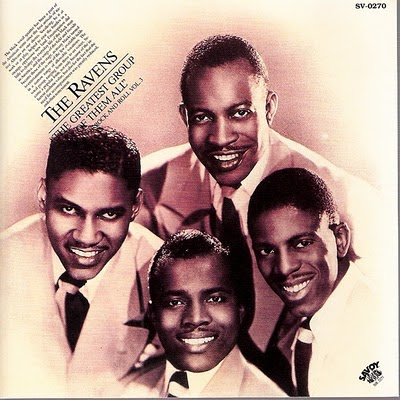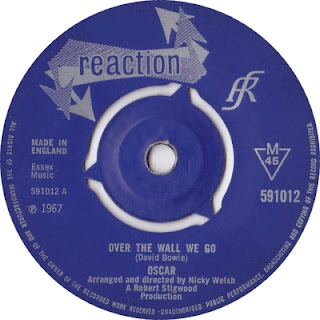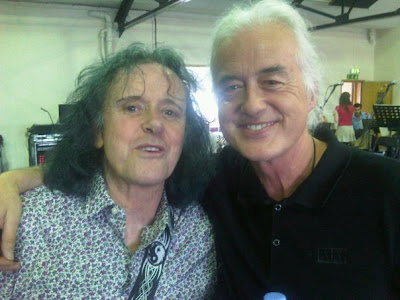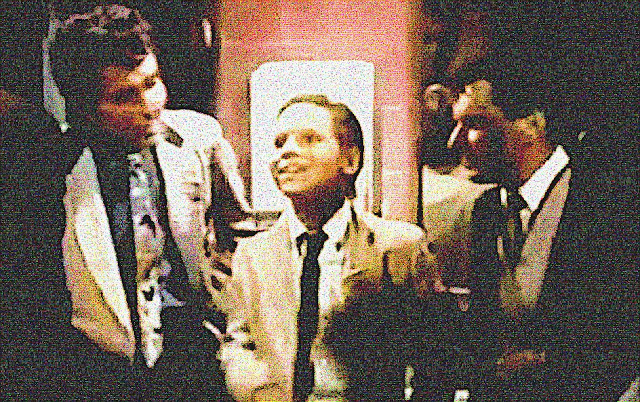
[screengrab]
Before I say anything else, can I remind readers who also listen to Spencer Leigh's On the Beat show on BBC Radio Merseyside that the deadline for responding to the BBC Trust's online questionnaire about local radio is Wednesday December 21st?
If you want to show your support for the programme, please consider answering at least Question 7 of the eight questions provided. The above image is only a screengrab so read more in the
previous post if you haven't done so already or go direct to the BBC Trust questionnaire
here.
On his show yesterday Spencer thanked listeners for Christmas cards and gifts but modestly said it wasn't necessary as the BBC license fee paid for the programme. But the questionnaire is a way in which all fans of the show, like me, can show our appreciation and perhaps extend the life of the programme - and you don't have to live in the Radio Merseyside region, as BBC iplayer makes locals of us all. I have filled it in myself and forwarded the comments which readers added to the previous post. Fingers crossed that On the Beat will continue for a lot longer.
I've written in the past about broadcasters who influenced my musical tastes but it occurs to me I never wrote to them at the time to say so, and in several cases it's too late, so it's good to be able to do something in this case.
But the fact that it never occured to me in the past even to drop a brief note of thanks to those broadcasters whose enthusiasms did so much to shape mine does make me think more generally that the job of deejay or broadcaster (one can't imagine Hubert Gregg thought of himself as a deejay) is, at least in part, an act of faith: the tangible signs of appreciation which come the broadcaster's way must be only a small fraction of the listenership. But the broadcaster must sit in the studio, imagining a sympathetic ear for his words - which is more or less the meaning of Vernon Green's word "pismotality."
Let me whisper sweet words of pismotality
Green was imagining a lover, but the intimacy of listening to the radio - especially late night shows, under the covers - is not dissimilar.
So as this is an anniversary of sorts - two years and a bit since I began this blog - and as my thoughts are with radio, let me salute once again those voices who shaped my tastes, with brief extracts from the series of earlier posts about them. Click on the names in bold to be taken to the full posts. Ken Sykora is pictured below, right, with Stephan Grapelli, former partner of his hero Django Reinhardt. The original post includes a link to Sykora's own version of Honeysuckle Rose, which nods to the Reinhardt-Grapelli recording.Here's how I summed up the effect of his 1970s late night Radio Clyde programme on me:
The title of his programme, Serendipity with Sykora, allowed him to play whatever he wanted, assuming some chance connection with the previous piece could be found, and the result was a beguiling mixture of novelty songs and jazz, knitted together with odd anecdotes and what came across as an absolute ease in the studio. I really wish I'd taped some of those shows at the time; alas, I have no record of any of them. It felt like a friend was informally guiding you through some records he happened to like, saying whatever came into his head about them or any loosely related matter, wholly at ease.
I'm happy to report that Carmel Gregg, Hubert Gregg's widow, read my piece on the great man and seemed to approve. You can find out more about his career and buy his autobiography, which details his long theatrical career,
here. Comparing his broadcasting style with that of Sykora, I wrote:
You could say that Gregg's presentation was more mannered than Ken Sykora's, but it didn't seem like that in the execution. Even if the programmes were audibly scripted, as opposed to Sykora's air of an informal chat, a similar intimacy was conveyed. In an age of prattle, that careful preparation felt like a courtesy, not a barrier. And so you learnt to accept phrases which would have sounded artificial coming out of any other presenter's mouth, like "No more for a se'enight," when the half hour had sped by yet again, and even grew to relish the inevitability of the pause you could have driven a car through during the middle of his sign-off: "And au revoir ... to you."
Just as it's said that Hutch (a Gregg favourite) had the power to make the audience in a vast variety hall feel as though they were enjoying a recitation in an elegant drawing room, these and other Greggorian turns of phrase had the effect of drawing listeners into a happy band of fellow conspirators who refused to acknowledge the end of a golden age of English and American music which stretched from the twenties to, I suppose, the late forties.
Whatever I didn't learn from Hubert Gregg or Robert Cushman I absorbed, almost unknowingly, from Benny Green; cruel friends used to delight in pointing out that all my spoutings about music were cribbed from his programme, which may have been truer than I cared to admit.
I didn't know it at the time, but Green was gradually and painlessly filling me with knowledge which was ultimately to prove professionally useful as well as a source of pleasure and metaphorical enrichment.
But I can't leave out those names whom I discovered later, once my tastes were more or less established. They have enhanced the pleasure of listening and brought some unexpected discoveries to my ears, but we're talking consolidation, not Damascene conversion. First of all, the one who carried on Benny Green's work:
Like Ken Sykora, Benny Green, Hubert Gregg and Ian Whitcomb [discussed below], he is also a musician, which may have helped foster the catholicity of taste on display; the programme's subtitle is "The art, craft and inspiration of the popular song."
The show appears to be scripted, but he has a real gift for succinct, accessible phrasemaking. It's different from Hubert Gregg's conscious stylisation, more like ordinary speech - but in a more compact, vivid form than the unscripted alternative, just as a current advert on British television for some kind of wonder yoghurt (or some such) boasts of its invigorating effects with the slogan: "You - but on a really good day."
Lorenz Hart, for example, is summed up as "Pint-sized genius of the lyric and tragical boozer" and we're told Spike Jones is "well known for taking the sweetest rose and crushing it till the petals fall - with a thunderous crash."
These brief quotes don't do justice to his links, where four or five interconnected ideas may whizz by in the transition from one record to another, with his trademark waspish understatement in a slightly raised voice inviting you into a joke.
I only discovered Ian Whitcomb's radio show about eighteen months ago - not long before happening upon Spencer Leigh's, in fact.
Like many another in the 60s, Whitcomb had an epiphany on hearing Zimmerman. In his case, however, this happened to be ragtime pianist Professor Dick Zimmerman, who "rescued me from rock & roll, setting me on the road backwards" - in which direction he has been strolling ever since, stooping to pick up discarded tin pan alley sheet music as he goes; he has even written an acclaimed book about the development of the popular song from its late nineteenth century roots, After the Ball.
Both Ian Whitcomb and Spencer Leigh have written extensively about music. Their areas of expertise may differ but I think another remark I made in the post might stand equally as an argument for the importance of Spencer Leigh's On the Beat programme. I said of Ian Whitcomb that
[His] awareness of the deep, tangled roots of popular music means that he is able to make the most illuminating comments in his show en passant, seeing the sort of connections others wouldn't.
And that's it for me - that is what drew me to most of the broadcasters above: Ken Sykora would play Peggy Lee and Spike Jones but also the Lovin' Spoonful's Nashville Cats, no doubt because it was about the joy of guitar playing, and that transcended boundaries - and I remember that, like Ian Whitcomb, he was also drawn to Hawaiian music. Popular music of the twentieth century is all interwoven, and Spencer Leigh's show also demonstrates that. So a final reminder: if you value On the Beat, as I do, please consider that BBC Trust questionnaire (direct link at top or see previous post) before it's too late. Again, the deadline is December 21st. (2011, if you're reading this many years hence.)
That would be a rather good place to stop, except that there are two more things I want to say, as evidence of what Kenny Everett might have called "intertwangularity."The first is that I recently heard Spencer remark on his show that he loved Russell Davies's programme.
And the second is a recent memory. I saw the New York cabaret singer Steve Ross perform a few weeks ago in a cabaret venue, the Pheasantry in the King's Road, Chelsea and had the chance to talk to him briefly afterwards.
The show, a tribute to Irving Berlin, featuring a mix of well known and more obscure numbers, made a big impression on me, for several reasons. The act of listening, staring across the otherwise empty table, called to mind a former partner with whom I associate the recordings of Hutch: they formed a soundtrack to to our time together, especially in the earliest days when one little room really was an everywhere.
I'm not sure whether it was a particular Berlin song also recorded by Hutch, or simply the conviction which Steve Ross brought to the songs, but either way I felt a sharp pang for an irretrievable past.
And there was another thing about that performance, which is related to my decades of radio listening to the likes of Hubert Gregg and Ken Sykora. Odd as it may sound, although I have been listening to and loving that sort of music for over thirty years, I don't think I had ever sat down at a cabaret style show like that before. Ever. The songs seemed alive in a way not possible through archive recordings broadcast over the airwaves.
And when I mentioned to Steve the people I had admired, like Hutch, and Mabel Mercer - familiar to me from both Benny Green and Robert Cushman's shows - I learnt they were known to him too: Mabel Mercer in particular had been, he said, a big influence. And the name of Robert Cushman was fondly greeted: he even praised his singing - which, I admit, is further than I would be prepared to go.
You could even say that the evening was a kind of culmination of a process - that is, if you were minded, like me, to tie a ribbon of sorts around this post. Let's have a go, anyway. Ahem. (clears throat, assumes solemnity of manner)
I listened as a teenager to love stories in song whispered through my transistor late at night.
Later, the whispering served another purpose: a backdrop to my own particular notion of some semblance of The Real Thing.
Now, thanks to the passion and the artistry of Steve Ross on that recent evening, the songs have been foregrounded once again. But this time I am more aware - and I'm talking about Berlin in particular, though it could equally apply to others - of the magic, or the vitality, or whatever you want to cry it, of these artefacts.
They are at once simple and profound. Direct, universal statements which somehow feel personally tailored at the same time. They are not The Thing Itself - real or otherwise - but they remind us of The Thing Itself. And they suggest that it's important. And they, at least, endure and they bring consolation as well as the odd stab of pain.
Most of all, maybe, they make me feel part of a larger world.
You can find Steve Ross's website
here. He says:
So much of cabaret is about love. It's the emotion we're always trying to be reminded of most of all.


















































